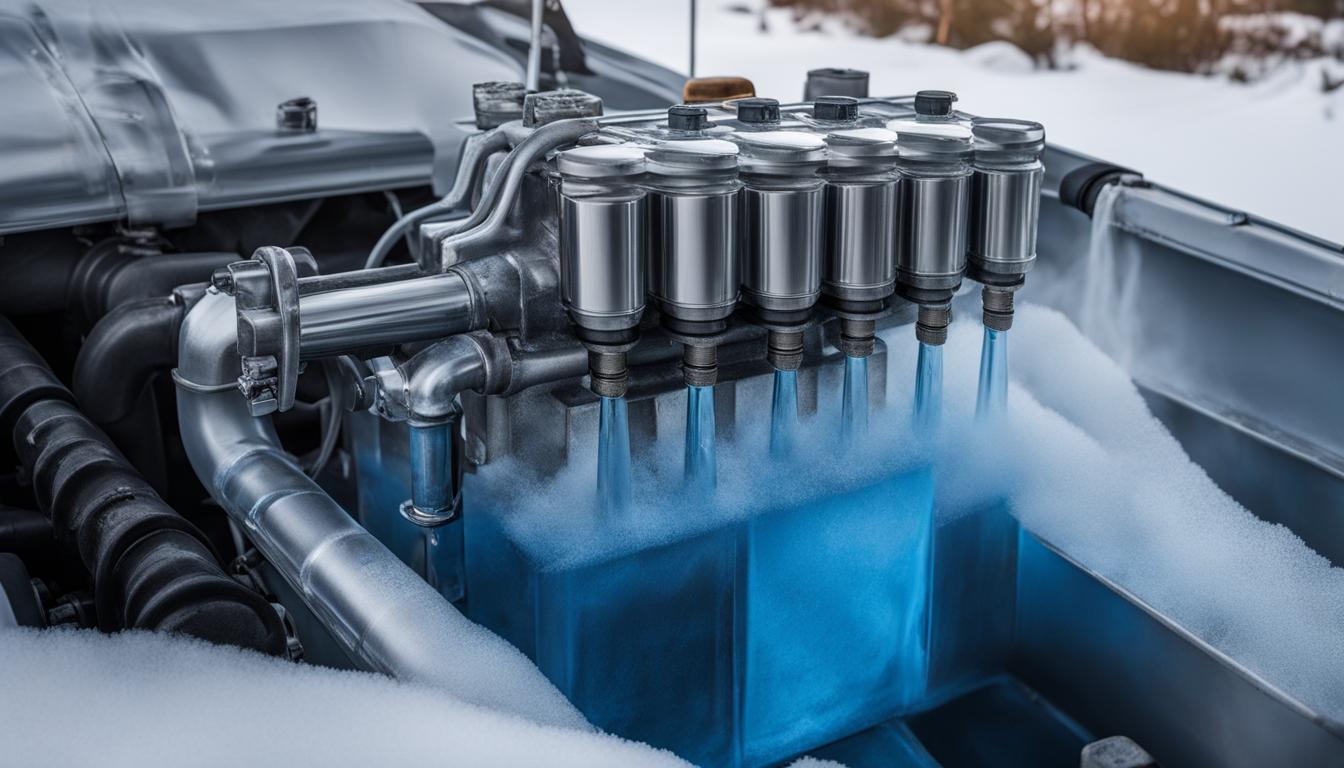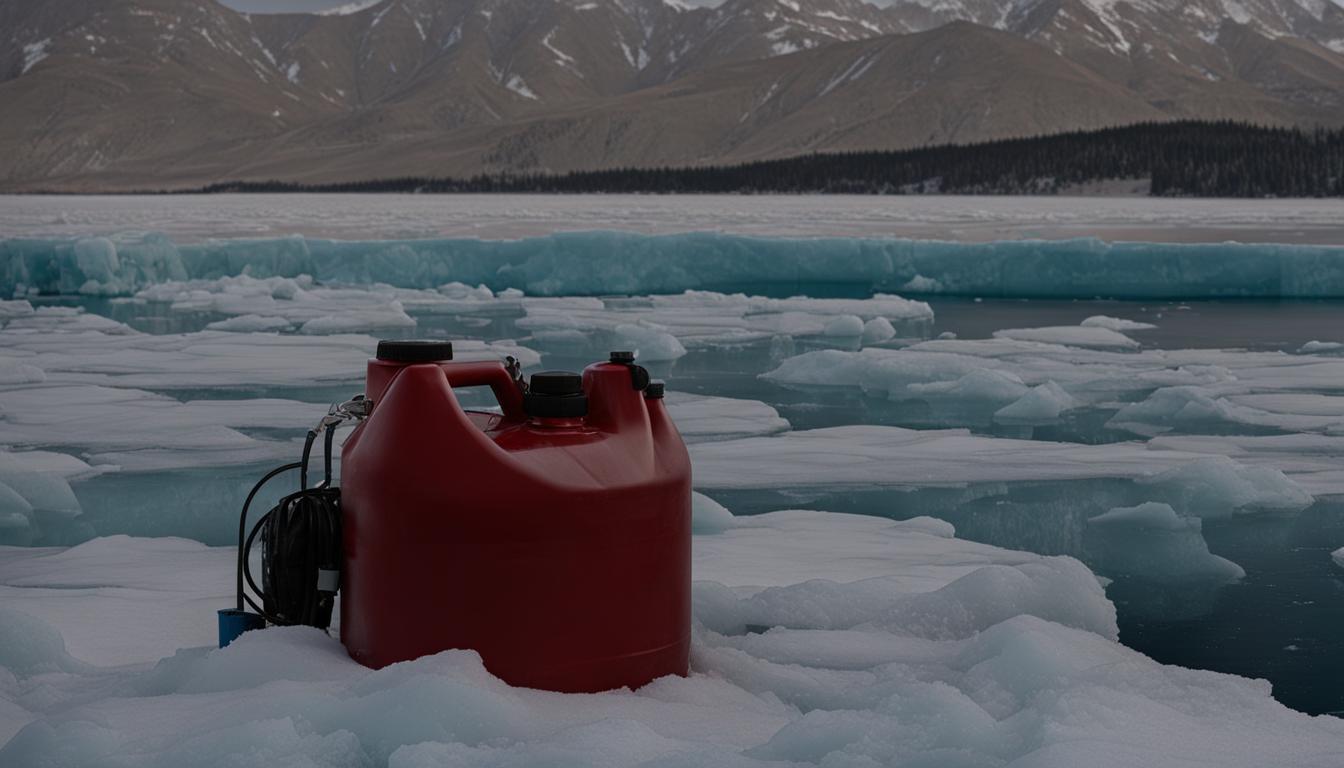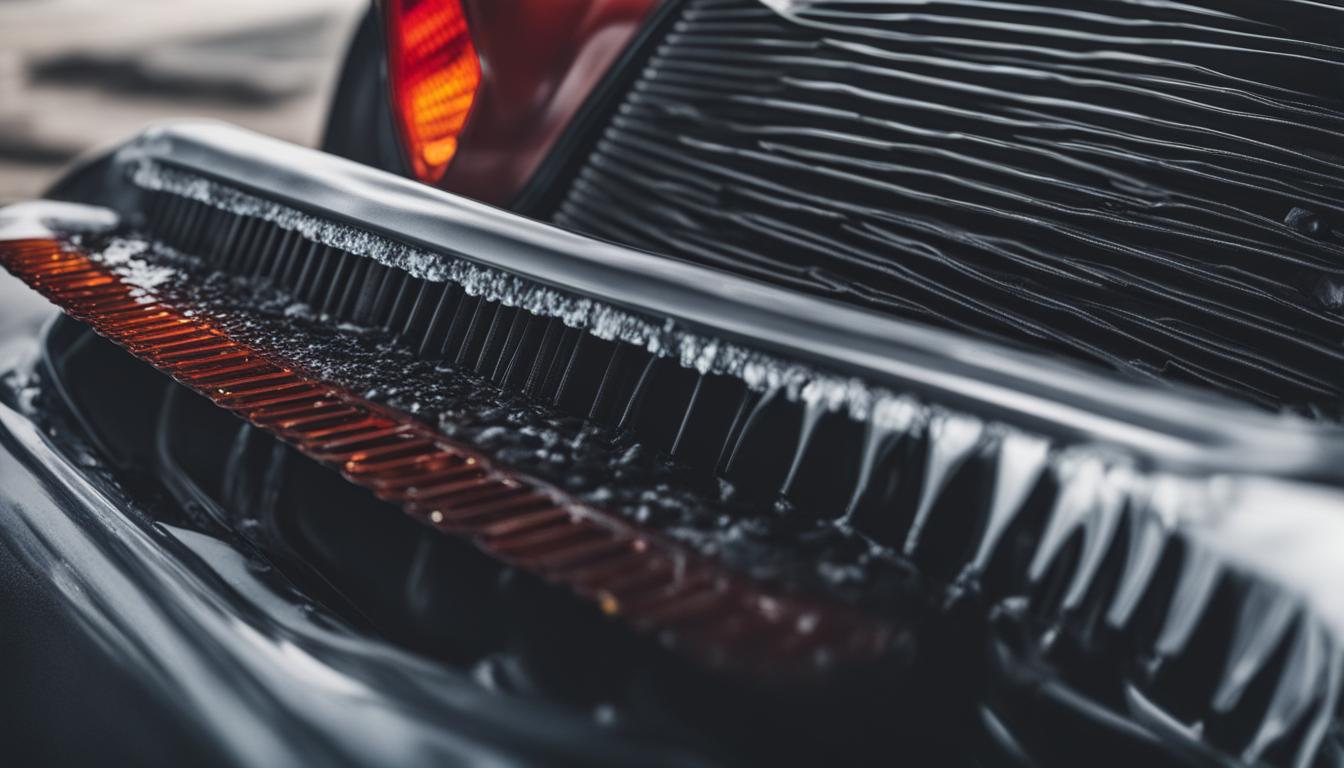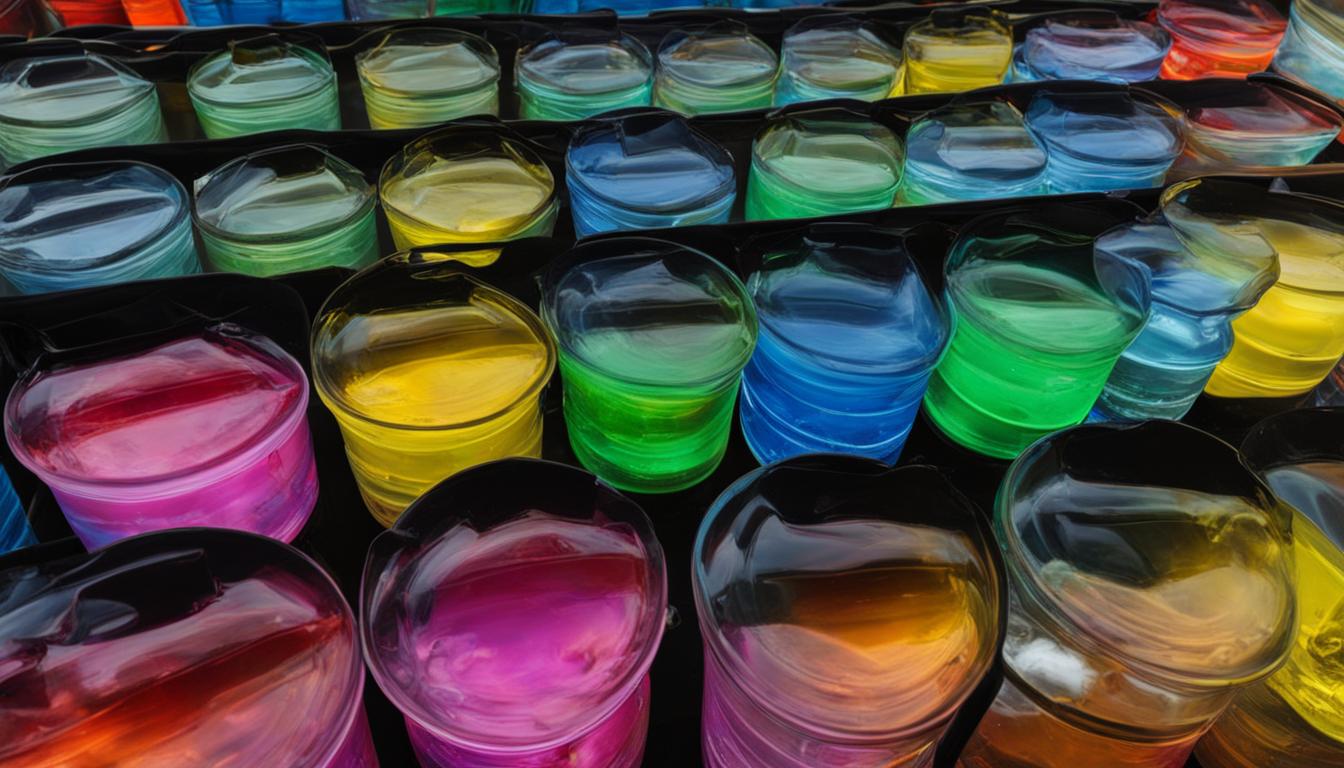Winterizing your boat is essential to protect your marine engine and plumbing systems from potential damage during the colder months. One important step in the winterization process is choosing the right type of antifreeze. There are different types of antifreeze available, but propylene glycol antifreeze is generally recommended for boat winterization. It is safer and more environmentally friendly than ethylene glycol antifreeze, which is toxic and harmful to pets and wildlife. Propylene glycol antifreeze is also compatible with potable water systems, making it a suitable choice for boats. The amount of antifreeze you need to use will depend on the climate of your area and the size and type of your boat’s engine and water systems.
Key Takeaways:
- Choosing the right type of antifreeze is crucial for boat winterization.
- Propylene glycol antifreeze is recommended for its safety and environmental friendliness.
- Ethylene glycol antifreeze is toxic and not suitable for use in boats.
- RV antifreeze, or pink antifreeze, can be used in certain applications.
- The amount of antifreeze needed depends on the boat’s engine and water system.
Propylene Glycol Antifreeze
Propylene glycol antifreeze is the recommended type of antifreeze for boat winterization. It is non-toxic, odorless, and tasteless, making it safe for use in potable water systems. Propylene glycol antifreeze is also environmentally friendly, as it is biodegradable and less corrosive compared to other types of antifreeze.
One of the key advantages of propylene glycol antifreeze is its higher boiling point and lower freezing point than water. This property helps prevent engine overheating during warmer months and protects against freezing during the winter months.
This type of antifreeze provides better freeze protection for boat engines and water systems compared to other options on the market.
Due to its safety and effectiveness, propylene glycol antifreeze is commonly used in boats to ensure optimal performance and protection against extreme temperatures.
Ethylene Glycol Antifreeze
While there are various types of antifreeze available for different applications, it’s important to understand that ethylene glycol antifreeze is not recommended for use in boats. This type of antifreeze is primarily used in automotive applications and poses serious risks when used in marine environments.
Ethylene glycol antifreeze is toxic and harmful to both pets and wildlife if ingested. The chemicals in this antifreeze can cause severe health issues and even be fatal. In addition to being harmful to living organisms, it is also damaging to the environment. If ethylene glycol antifreeze leaks into the water, it can have a detrimental impact on marine life.
Given the potential risks and the availability of safer alternatives, it is highly recommended to avoid using ethylene glycol antifreeze in your boat. Choosing a marine-specific antifreeze, like propylene glycol antifreeze, is a much safer option for winterizing your boat and protecting your engine and plumbing systems. By selecting the right antifreeze, you can safeguard your boat while also prioritizing the well-being of pets, wildlife, and the environment.

| Key Points | Benefits |
|---|---|
| Toxicity | Highly toxic and harmful to pets and wildlife |
| Environmental Impact | Can cause damage to the environment and marine life |
| Recommendation | Not recommended for use in boats |
RV Antifreeze
When it comes to winterizing your boat, choosing the right antifreeze is essential. One option that stands out is RV antifreeze, also known as pink antifreeze. It provides excellent protection for your boat’s water systems during the colder months.
RV antifreeze is a non-toxic solution that is safe for use in potable water systems. This means you don’t have to worry about any harmful effects on your health or the environment. It is tasteless and odorless, making it convenient to use in your boat.
Obtaining RV antifreeze is easy, as it is readily available at most marine supply stores. You can find it in various quantities, depending on the size and needs of your boat. Simply follow the manufacturer’s instructions for proper application.
Benefits of RV Antifreeze:
- Non-toxic and safe for use in potable water systems
- Tasteless and odorless
- Readily available at marine supply stores
- Provides excellent freeze protection for your boat’s water systems
Using RV antifreeze is a simple and effective way to safeguard your boat’s water systems during the winter months.
How Much Antifreeze To Use
The amount of antifreeze you need to use for winterizing your boat depends on several factors, including your boat’s coolant capacity, engine size, and the type of cooling system it has. To determine the appropriate quantity of antifreeze, it’s essential to consider these factors and ensure proper protection against freezing temperatures.
A general rule of thumb is to add one gallon of antifreeze for every 50 gallons of coolant capacity. This ratio provides an effective balance for most boats and helps prevent freezing in the cooling system.
For boats equipped with freshwater cooling or air conditioning systems, you may require a larger quantity of antifreeze. Approximately 3-4 gallons of antifreeze are often necessary to ensure adequate protection for these types of water systems.
In contrast, boats with raw water cooling systems typically require less antifreeze. Generally, 1-2 gallons of antifreeze are sufficient for winterization.
It is crucial to consult your boat’s owner manual or seek professional advice for specific guidance on the amount of antifreeze to use. These resources can provide you with detailed information tailored to your boat’s make, model, engine size, and cooling system type.
The Importance of Antifreeze
When it comes to protecting your boat’s engine and its vital components, antifreeze plays a crucial role. Its importance cannot be overstated, as it serves multiple key purposes that are essential for the overall health and performance of your boat.
First and foremost, the primary purpose of antifreeze is to prevent freezing. By lowering the freezing point of water, antifreeze ensures that the engine’s cooling system remains liquid, even in extremely cold temperatures. This prevents the formation of ice, which can cause significant damage to the engine.
In addition to freezing prevention, antifreeze also plays a vital role in protecting the engine’s components from potential damage. The antifreeze helps to lubricate the water pump, reducing friction and ensuring smooth operation. It also acts as a coolant, regulating the engine’s temperature and preventing overheating. By maintaining optimal temperature levels, antifreeze allows your engine to function efficiently and helps prolong its lifespan.
Another important function of antifreeze is corrosion prevention. The cooling system of a boat is susceptible to rust and corrosion, especially when exposed to water and various metals. Antifreeze contains special additives that create a protective barrier inside the cooling system, preventing corrosion and rust from forming. This helps maintain the integrity of the system and ensures its longevity.
Overall, antifreeze is a critical component for the proper functioning and protection of your boat’s engine. Its ability to prevent freezing, protect engine components, regulate temperature, and prevent corrosion is invaluable for the overall health and longevity of your boat.
Now that we understand the importance of antifreeze, let’s take a closer look at the factors that can affect the amount of antifreeze needed for your boat’s winterization process.
Table: The Importance of Antifreeze
| Importance | Purpose |
|---|---|
| Prevents Freezing | Lowers the freezing point of water, preventing ice formation |
| Protects Engine Components | Lubricates the water pump, regulates temperature, prevents overheating |
| Prevents Corrosion | Additives prevent rust and corrosion, ensuring the longevity of the cooling system |

Factors That Affect The Amount Of Antifreeze
When it comes to winterizing your boat, it’s essential to consider several factors that can affect the amount of antifreeze needed. Boat size and engine size play a significant role in determining the quantity of antifreeze required. Larger boats generally have larger water systems and components, so they typically require more antifreeze to provide adequate freeze protection.
In addition to boat size, the type of water system in your boat is another critical factor. There are different types of water systems, such as raw water cooling and freshwater cooling or air conditioning systems, each requiring a specific amount of antifreeze. Raw water cooling systems, for example, may require less antifreeze compared to freshwater cooling or air conditioning systems.
To better understand the factors affecting the amount of antifreeze needed, let’s break them down:
- Boat Size: The size of your boat can influence the amount of antifreeze required for winterization. Larger boats typically have larger water systems, including plumbing and engine components, which necessitate more antifreeze for adequate protection.
- Engine Size: The size of your boat’s engine plays a role in determining the antifreeze quantity. Larger engines may require more antifreeze to ensure proper freeze protection and temperature regulation.
- Water System Type: The type of water system in your boat, whether it’s a raw water cooling system or a freshwater cooling or air conditioning system, affects the amount of antifreeze needed. Raw water cooling systems often require less antifreeze compared to freshwater cooling or air conditioning systems.
- Freeze Protection: The level of freeze protection you desire for your boat also impacts the amount of antifreeze needed. Depending on your location and the severity of winter temperatures, you may need to use more antifreeze to ensure adequate protection against freezing.
By considering these factors, you can determine the appropriate amount of antifreeze required for your boat’s winterization. Properly assessing boat size, engine size, water system type, and freeze protection needs will help ensure that your boat is adequately protected and prepared for the colder months.

The Difference Between Marine vs. Auto Antifreeze
When it comes to choosing the right antifreeze for your boat, understanding the difference between marine and automotive antifreeze is crucial. Marine antifreeze, such as propylene glycol antifreeze, is specifically designed for use in boats and is safe for marine engines. On the other hand, automotive antifreeze is intended for use in car engines and may contain ethylene glycol, which can be toxic and harmful.
Compatibility and Safety
Marine antifreeze, like propylene glycol antifreeze, is not only non-toxic but also non-corrosive and biodegradable. It is formulated to be safe for use in boats, as it protects the engine and cooling system without posing a risk to the environment or wildlife. Automotive antifreeze, on the other hand, may contain ethylene glycol, a toxic substance that can be harmful if ingested by pets or wildlife.
Boat Coolant Applications
Marine antifreeze is specifically formulated to meet the unique needs of marine engines and coolant systems. It provides excellent freeze protection, helping to prevent damage to the engine and plumbing systems during the winter months. Marine antifreeze is also compatible with potable water systems found in boats, ensuring safe and efficient operation. On the other hand, automotive antifreeze is designed for car engines and may not provide the same level of protection or compatibility for marine applications.
Choosing the Right Antifreeze
When winterizing your boat, it is important to choose the right antifreeze to ensure optimal performance and protection. Marine antifreeze, such as propylene glycol antifreeze, is the recommended choice for boats due to its compatibility, safety, and environmental friendliness. Using automotive antifreeze in a boat can pose risks to both the engine and the environment, making it essential to opt for marine-specific antifreeze.
Summary
In conclusion, the difference between marine and automotive antifreeze lies in their formulation, compatibility, and safety. Marine antifreeze, like propylene glycol antifreeze, is designed specifically for boats, offering safe and efficient protection for marine engines and coolant systems. Automotive antifreeze, however, is intended for car engines and may not provide the same level of safety or compatibility for boat applications. To ensure optimal performance and protection, always use marine antifreeze when winterizing your boat.
| Marine Antifreeze | Automotive Antifreeze |
|---|---|
| Non-toxic, non-corrosive, and biodegradable | May contain toxic and harmful substances |
| Specifically formulated for marine engines and coolant systems | Designed for use in car engines |
| Compatible with potable water systems in boats | May not be compatible with marine applications |
| Provides excellent freeze protection | May not offer the same level of protection for marine applications |
Boat Winterizing Tips and Best Practices
When it comes to winterizing your boat, following best practices and tips is crucial to ensure effective winterization and protection against freezing temperatures. By taking the necessary steps, you can safeguard your boat’s engine and plumbing systems, keeping them in optimal condition for the upcoming season.
Properly Drain Water Systems
Before winter arrives, it’s important to thoroughly drain your boat’s water systems. This includes draining the freshwater tank, hot water heater, and any other water lines or tanks. By removing all the water, you can prevent it from freezing and causing damage to your boat’s plumbing system.
Flush with Antifreeze
After draining the water systems, it’s recommended to flush them with antifreeze. This ensures that any remaining water is replaced with antifreeze, which will prevent freezing and also protect the plumbing components from corrosion. Ensure you use the correct type and amount of antifreeze for your boat.
Check and Top Off Coolant Levels
During winterization, it’s a good practice to check and top off the coolant levels in your boat’s engine. This helps to maintain the proper level of antifreeze in the coolant system, preventing the engine from freezing and providing adequate protection against extreme temperatures.
Inspect Hoses and Fittings
Take the time to inspect all hoses and fittings in your boat. Look for any signs of wear, cracks, or leaks. Replace any damaged components to ensure the integrity of your boat’s plumbing system. Additionally, check the hose clamps and tighten them if necessary to prevent any potential leaks.
Store Your Boat in a Dry and Secure Location
When winterizing your boat, it’s important to choose a dry and secure location for storage. This will help protect your boat from the elements, preventing damage caused by snow, ice, and strong winds. Consider storing your boat in a covered storage facility or using a boat cover to provide additional protection.
Regular Maintenance and Winterization Techniques
In addition to following these best practices, it’s essential to perform regular maintenance on your boat throughout the year. This includes proper engine maintenance, such as changing the oil and filters, as well as inspecting and replacing any worn-out parts. By incorporating winterization techniques into your regular maintenance routine, you can ensure that your boat is always in optimal condition.
By following these boat winterizing tips and best practices, you can protect your boat’s engine, plumbing systems, and other components from potential damage during the winter months. Remember to use the recommended amount and type of antifreeze, properly drain water systems, and store your boat in a dry and secure location. Regular maintenance and proper winterization techniques will ensure that your boat is ready for the upcoming boating season.
Conclusion
Proper winterization of your boat is essential to protect your marine engine and plumbing systems from potential damage during the colder months. To ensure effective winterization, it is crucial to choose the right type and amount of antifreeze. Propylene glycol antifreeze is the recommended option for boat winterization due to its non-toxic and environmentally friendly properties. This type of antifreeze is safe to use in potable water systems and offers better freeze protection than other alternatives.
On the other hand, ethylene glycol antifreeze should be avoided in boats as it is toxic and can harm pets and wildlife if ingested. It is also harmful to the environment, especially if it escapes into the water. While RV antifreeze can be used in certain applications, it may not provide the same level of protection as marine antifreeze, so it is important to consider its limitations.
When determining the amount of antifreeze needed, factors such as the size and type of your boat, as well as its water systems, should be taken into account. Following best practices and tips for boat winterization, such as properly draining water systems, flushing with antifreeze, and inspecting hoses and fittings, will help ensure that your boat is properly protected and ready for the winter season. By taking these steps, you can enjoy peace of mind knowing that your boat’s engine and plumbing systems are safeguarded, and be ready for smooth sailing when warmer weather returns.
FAQ
What type of antifreeze should I use to winterize my boat?
Propylene glycol antifreeze is the recommended type of antifreeze for boat winterization. It is non-toxic, environmentally friendly, and safe for use in potable water systems.
Why is ethylene glycol antifreeze not recommended for boats?
Ethylene glycol antifreeze is toxic and can be harmful to pets and wildlife if ingested. It is also harmful to the environment and can cause damage to marine life if it leaks into the water.
Can I use RV antifreeze for boat winterization?
Yes, RV antifreeze, also known as pink antifreeze, is a suitable option for boat winterization. It is non-toxic, safe for use in potable water systems, and easy to use.
How much antifreeze do I need to use for winterizing my boat?
The amount of antifreeze required depends on factors such as your boat’s coolant capacity, engine size, and water system type. Consult your boat’s owner manual or seek professional advice for specific guidance on the amount of antifreeze to use.
What is the purpose of antifreeze in a boat’s engine?
Antifreeze prevents freezing, protects engine components, regulates engine temperature, lubricates the water pump, and prevents corrosion. It lowers the freezing point of water, preventing the engine’s cooling system from freezing and expanding.
What factors affect the amount of antifreeze needed for winterizing a boat?
Boat size, engine size, and water system type can influence the amount of antifreeze required. Larger boats generally require more antifreeze, and different types of cooling systems may require varying amounts of antifreeze.
What is the difference between marine antifreeze and automotive antifreeze?
Marine antifreeze is specifically designed for boat applications and is safe for use in boats. Automotive antifreeze may contain toxic ingredients harmful to pets and wildlife and is not recommended for boats.
What are some tips for winterizing a boat and using antifreeze?
Properly drain water systems, flush with antifreeze, check and top off coolant levels, inspect hoses and fittings, and store your boat in a dry and secure location. Follow best practices for boat winterization to ensure effective protection against freezing temperatures.

